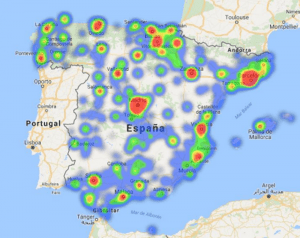The dynamics of European tourism have drastically changed in 2024. Travelers’ preferences, driven by technology and shifts in consumption patterns, have led to a boom in certain regions of the European Union (EU). Andalusia, a jewel in southern Spain, stands out as a key destination that has captured the attention of millions of tourists. In this article, we will explore the reasons behind the growth of Andalusia and other regions, the relevance of heat maps in tourism planning, and how advanced analytical tools are transforming the sector.
The Rise of Andalusia: Why Has It Become a Tourist Magnet in 2024?
In 2024, Andalusia has caught the attention of millions of tourists seeking authentic, cultural, and high-quality experiences in Europe. This boom has not been accidental but is the result of a combination of factors that have made this region a prime destination for travelers from around the world. Andalusia has successfully capitalized on its rich cultural heritage, favorable climate, and diverse offerings to attract a wide variety of tourist profiles.

The Perfect Combination of Culture, Climate, and Connectivity
Andalusia has emerged as an undisputed leader in online tourism reservations during 2024. This success is due to a combination of factors that have made the region irresistible to travelers. With historic cities like Seville, Granada, and Córdoba, a stunning coastline along the Costa del Sol, and a rich and diverse cultural offering, Andalusia provides a comprehensive tourist experience.
Innovation in Andalusian Tourism: Digital Marketing and Public-Private Collaboration
Another key factor in Andalusia’s boom has been innovation in digital marketing and effective collaboration between the public and private sectors. The Andalusian Government has worked closely with booking platforms and tour operators to promote the region more effectively, using segmented campaigns and real-time data to attract different tourist profiles.
Heat Maps: The Essential Tool for Understanding Tourist Preferences
In a world where information is power, heat maps have become an indispensable tool for tourism managers. These visual representations allow authorities and tour operators to identify the most visited areas and adjust their strategies accordingly. In the case of Andalusia, heat maps have been used to better understand tourist behavior and optimize both promotion and destination management.
 What Are Heat Maps and How Do They Work in Tourism?
What Are Heat Maps and How Do They Work in Tourism?
Heat maps are visual representations that show the concentration of activity in different geographical areas. In the context of tourism, these maps are crucial tools that help identify the most popular areas and enable tour operators and local governments to make informed decisions about planning and infrastructure development.
The Application of Heat Maps in Andalusia
In Andalusia, heat maps have become a vital tool for understanding tourist behavior. By analyzing online booking data and visitor mobility, authorities have been able to identify the busiest areas, optimize resource management, and improve the overall tourist experience. For example, in the Costa del Sol, heat maps have been key in distributing the flow of tourists and avoiding overcrowding on beaches and in urban centers.
Planning Tools: The Key to Maximizing Tourism Potential
In an increasingly competitive tourism environment, strategic planning is essential to maximizing a region’s potential. Advanced analysis and planning tools, such as predictive analysis and personalized tourist experiences, have revolutionized how tourist destinations are managed in Europe. Once again, Andalusia has stood out in this field by adopting innovative technologies that have allowed it to anticipate trends and meet visitors’ expectations.
Predictive Analysis and Personalization: The Future of Tourism Planning
Predictive analysis tools have revolutionized how tourist regions plan their strategies. Using historical data and current trends, these tools allow for more accurate predictions of tourist demand. Additionally, personalizing the tourist experience through online platforms has been crucial in attracting and retaining visitors.
Success Stories: Andalusia’s Strategy in 2024
Andalusia has been a pioneer in adopting these tools, enabling it to anticipate demand peaks and adapt its offerings more efficiently. For example, the use of artificial intelligence to personalize accommodation and activity recommendations has significantly improved tourist satisfaction, resulting in a higher number of repeat bookings.
Comparison with Other EU Regions: Where Does Andalusia Stand?
While Andalusia has led the growth in online reservations in 2024, other EU regions have also experienced a notable boom. Comparing these regions allows us to understand the dynamics of the European tourism market and better position Andalusia in this context.
Other Booming Regions in 2024
Although Andalusia has been one of the fastest-growing regions, it is not alone. Regions like Catalonia, Provence-Alpes-Côte d’Azur in France, and the Ionian Islands in Greece have also seen a significant increase in online reservations. Comparing these regions allows us to better understand current tourism trends and Andalusia’s position in the European context.
Common and Differentiating Factors Among Leading Regions
When analyzing the regions with the most reservations, we find common factors such as investment in tourism infrastructure, effective digital promotion, and collaboration between sectors. However, each region has its own set of attractions and challenges. Andalusia, for example, has capitalized on its cultural diversity and unique gastronomic offerings, while other regions have leveraged their geography or specific events.
Conclusion: The Future of Tourism in the EU and Andalusia’s Central Role
Andalusia has demonstrated in 2024 that, with the right strategy, it is possible to lead in the competitive EU tourism market. The combination of a diverse offering, the use of advanced technologies like heat maps, and intelligent planning have been the pillars of its success. As other regions follow its example, the future of tourism in the EU seems to be marked by innovation and constant adaptation to new market demands.






